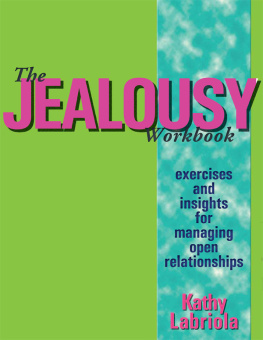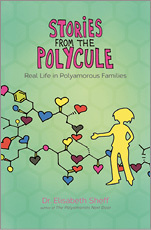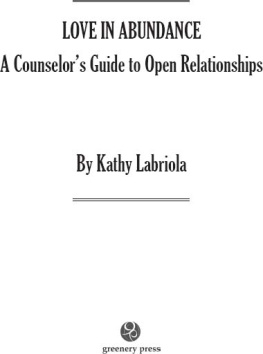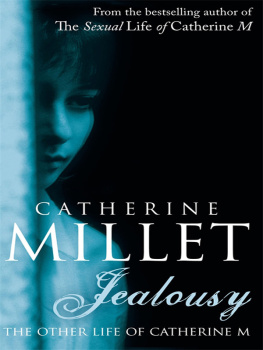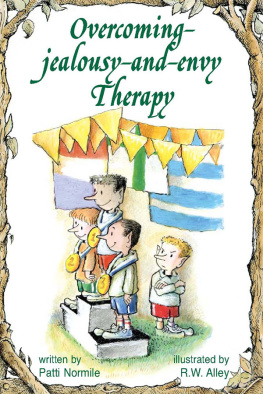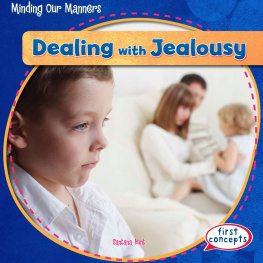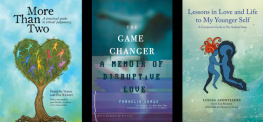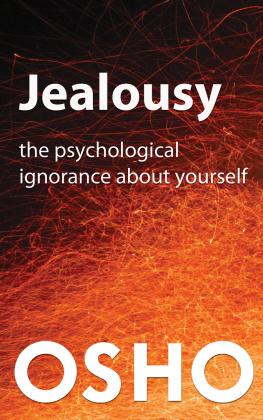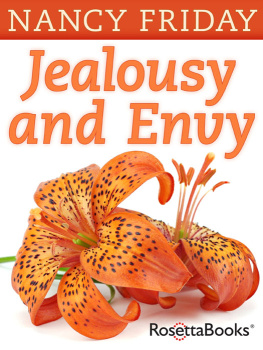Introduction:
Use this book to manage your jealousy!
I am a counselor, nurse, and hypnotist in private practice in Berkeley, California, and I work with many people who are struggling with jealousy. Many of my clients are involved in some type of open relationship, either by choice or by chance. In open relationships, each partner is allowed to pursue sexual or romantic relationships with other partners outside the relationship, within the parameters of a negotiated agreement.
In my experience with clients, jealousy seems inevitable in this type of relationship. Each partner is agreeing to the unpredictability, stress, time pressures, complications, and insecurities of adding outside relationships to an existing relationship. Allowing your partner and yourself the freedom to pursue other sexual relationships is one of the hardest things you are likely to attempt in your lifetime. As a result, the experience of jealousy should not seem surprising, but rather to be expected.
I have developed many techniques and exercises to help people understand their jealousy and make it much more manageable. A few of these techniques appeared in my previous book, Love in Abundance: A Counselors Advice on Open Relationships, published by Greenery Press in 2010.
Because jealousy is the most common problem my clients experience in open relationships, many have asked me for more resources on this topic, especially a jealousy workbook to make it easier for them to confront and tame the green-eyed monster. I hope the exercises in this workbook will help to meet that need. I intend to provide immediately accessible, simple techniques that are easy to implement in the event of an intense jealousy crisis. My experience is that these exercises are even more useful if undertaken over a period of time before a jealousy crisis happens, to be more prepared and skilled in managing jealousy when it does occur.
And if you are one of those extremely rare individuals who does not experience jealousy, you may find this book useful in understanding your partners jealousy. I have included a few simple exercises that you can put into practice when a partner is experiencing jealousy and needs your active listening, emotional support, validation of their feelings, and/or problem-solving help.
I have also worked with many clients who are in monogamous relationships, but who experience jealousy even with a monogamous partner. Some of these exercises have proven useful to them as well in identifying what triggers their jealousy, what feelings, thoughts, and physical sensations they experience during a jealousy episode, what the root causes are, and how to reduce their jealousy.
The workbook is divided into two sections. The first section is intended to give you a broader overview of jealousy: how it works and why it is so powerful. This section includes exercises which can be practiced anytime, ideally before a jealousy situation arises. This is a little bit like working out at the gym to build up your strength and stamina before running a marathon or climbing a mountain. Exercising your jealousy management muscles by reading and trying out these exercises is intended to make you feel calmer and more in control when you do experience jealousy because you will understand your jealousy, be alert for jealousy triggers, and have some practical techniques to implement immediately when the jealousy starts.
The second section is focused on techniques to implement in a jealousy crisis. You may notice that some of these, especially in the earlier parts of the section, seem almost too simple. These techniques started out as much more complicated and, I proudly thought, sophisticated. However, I discovered that when someone is in the grip of intense jealousy, they are not usually thinking rationally, nor are they capable of implementing any complex formulas. They need something fast and simple that can be used when they are not at their best.
You are likely to find some of these exercises much more useful than others, as each person has their own unique jealousy profile and their own distinct needs. I would encourage you to browse through the workbook and choose a few techniques to try right away, depending on your specific concerns.
In addition to utilizing this book, I would also encourage you to seek out and use other valuable resources in managing jealousy. Many people have studied this subject and developed extremely useful resources. I have included an appendix at the end of the book that lists other books, classes, and websites, as well as podcasts and resource lists that you are likely to find helpful.
PART ONE
Understanding Your Jealousy
Chapter One:
Is an open relationship right for you?
M anaging your jealousy takes a lot of hard work, and can be stressful and painful. Before you decide whether you want to take on this challenge, it is important to assess whether you are a good candidate for some type of open relationship.
Most people have gone through life assuming that they are monogamous by nature. This is partially because they have been influenced by the models they see around them in a society that only values monogamous relationships, and by cultural and religious values instilled in childhood. Until they get involved with a partner who wants an open relationship, or are otherwise exposed to new models of relationships, they have no context to understand alternatives to monogamy. However, many people try to be polyamorous, due to pressure from a partner or their peer group, without carefully assessing whether this relationship style is right for them.
This assessment is a crucial step in deciding whether to pursue an open relationship and work through your jealousy. If in fact you have an inherent inclination towards monogamy, a non-monogamous relationship may not be feasible for you, and it may not be fruitful to struggle with your jealousy. Utilize the following two exercises to assess the authentic relationship orientation that best meets your needs.
Exercise One. Your relationship role models
This exercise is designed to help you see how you may have been influenced by relationships you have observed, as well as your own relationships.
Step One: What role models have you had for relationships?
Think about the relationships you have seen throughout your life, starting with the family in which you were raised.
In your childhood home, was there a monogamous relationship? This question may be difficult to assess, as you may not know whether your parents were monogamous or whether one or both had affairs or outside relationships. If you believe that their relationship was monogamous, did it seem like a healthy and happy relationship to you? Did your parents stay together as a couple throughout your childhood, or did they separate or divorce? Did either parent develop a new relationship or remarry, and did you have any stepparents? What about other relatives, such as aunts, uncles, and grandparents? Did they appear to be in monogamous relationships or not? Were these healthy relationship models for you?
During your childhood, did you see examples of cheating or affairs, and if so, what were the consequences of those relationships? What about other adults in your life during your childhood, such as teachers, mentors, friends of the family, parents of your schoolmates: were they in monogamous relationships or some other form of relationship? Did those relationships seem stable and successful? Did you see any examples of open relationships among any of the adults during your childhood? If so, did they seem healthy and harmonious to you? Looking at all these relationships, write down below the ones that seemed happiest or that you may have wished to emulate, such as my mother and stepfather, or my best friends parents, or my uncle and his boyfriend.
Next page
